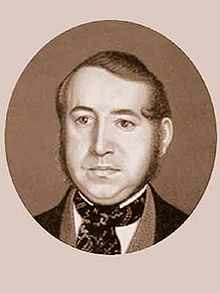Queer Places:
Estate of princes Golitsyn, R74, 61, Sima, Vladimirskaya oblast', Russia, 601830
 Filipp
Filippovich Vigel (November 23, 1786 - March 20, 1856) was a Russian
noble of
Swedish extraction who served in the foreign ministry, accompanied
Count Golovkin on his mission to
China,
presided over the department of foreign religions and governed the town of
Kerch.
Filipp
Filippovich Vigel (November 23, 1786 - March 20, 1856) was a Russian
noble of
Swedish extraction who served in the foreign ministry, accompanied
Count Golovkin on his mission to
China,
presided over the department of foreign religions and governed the town of
Kerch.
He was born in the village of Uspenskoye
(Simbukhino, Simbukhovo), Penza Province (today the village of Kalinino,
Penza district, Penza Region) into the family of the General, Penza
Governor F. L.
Filipp Vigel spent
his childhood in Kiev, then lived in Moscow and in the estate of Princes
Golitsyns, where he studied Russian literature for some time taught by I.
A. Krylov. Having completed his education, Vigel served in the Archives of
the Board of Foreign Affairs, numerous departments of the Ministry of
Finance, Foreign and Interior Ministries.
In 1824-1826 F. Vigel
was the Vice-Governor of Bessarabia, then the Governor of Kerch for two
years. Having returned to Petersburg in 1829, he became Director of the
Theological Affairs of Foreign Confessions Department. Vigel resigned in
1840 in the rank of the privy councilor which was equal to the rank of
lieutenant general.
Vigel witnessed every major event of
Alexander I's reign and conversed with a great number of Russian
cultural luminaries, including his colleagues at the
Arzamas Society such as
Alexander Pushkin, who gently mocked Vigel's
homosexual proclivities in a verse epistle.
Vigel is remembered primarily for his copious
memoirs covering the history of Russia from the reign of
Emperor Paul to the
November Uprising (1831). They were published by
Mikhail Katkov in 1864; the expanded edition (1892) appeared in seven
books. After the re-edition in 1928 they were named the
“Notes”. The “Notes” also reveal the friendship
of the memoirist with M. N.
Zagoskin which began in their youth in Penza.
Vigel's reminiscences are engaging, pithy and readily quotable. They
are considered unreliable in so far as they concern the Western-leaning
literati such as
Nikolai Gogol and
Pyotr Chaadayev. Vigel hated them passionately. It was Vigel who
denounced Chaadayev to the authorities.
My published books:


BACK TO HOME PAGE

- https://en.wikipedia.org/wiki/Filipp_Vigel
- https://www.prlib.ru/en/history/619746
 Filipp
Filippovich Vigel (November 23, 1786 - March 20, 1856) was a Russian
noble of
Swedish extraction who served in the foreign ministry, accompanied
Count Golovkin on his mission to
China,
presided over the department of foreign religions and governed the town of
Kerch.
Filipp
Filippovich Vigel (November 23, 1786 - March 20, 1856) was a Russian
noble of
Swedish extraction who served in the foreign ministry, accompanied
Count Golovkin on his mission to
China,
presided over the department of foreign religions and governed the town of
Kerch. 
